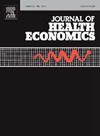The hidden toll of the pandemic: Excess mortality in non-COVID-19 hospital patients
Abstract
Seasonal infectious diseases can cause demand and supply pressures that reduce the ability of healthcare systems to provide high-quality care. This may generate negative spillover effects on the health outcomes of patients seeking medical help for unrelated reasons. Separating these indirect burdens from the direct consequences for infected patients is usually impossible due to a lack of suitable data and an absence of population testing. However, this paper finds robust empirical evidence of excess mortality among non-COVID-19 patients in an integrated public healthcare system: the English National Health Service (NHS). Analysing the forecast error in the NHS’ model for predicted mortality, we find at least one additional excess death among patients who sought medical help for reasons unrelated to COVID-19 for every 42 COVID-19-related deaths in the population. We identify COVID-19 pressures as a key driver of non-COVID-19 excess mortality in NHS hospitals during the pandemic, and characterize the hospital populations and medical conditions that were disproportionately affected. Our findings have substantive relevance in shaping our understanding of the wider burden of COVID-19, and other seasonal diseases more generally, and can contribute to debates on optimal public health policy.

 求助内容:
求助内容: 应助结果提醒方式:
应助结果提醒方式:


